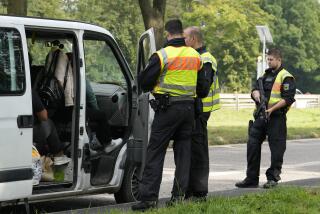Germans Turning Back Potential Refugees : Europe: Rejections are the first since World War II. They are part of a broad tightening of immigration controls across the Continent.
- Share via
BERLIN — As part of a broad tightening of immigration controls throughout Western Europe, Germany began turning back potential refugees at its frontiers Thursday for the first time since World War II.
Throughout the day, television newscasts showed guards on the German-Czech border stopping foreign-looking travelers, loading them into vans and driving them back to the Czech side.
Cameras also showed uniformed guards checking passports on the tarmac at Frankfurt airport as passengers descended aircraft steps and a reception building with a concrete-walled enclosure at Berlin’s Schoenefeld Airport, where asylum-seekers would be detained and interviewed to determine if they are eligible to enter the country.
The strengthening of Germany’s borders, which began at midnight, is the result of new legislation that ends a 44-year era in which the country automatically guaranteed refuge to those who declared themselves politically persecuted.
For people of the Third World and Eastern Europe, the new law effectively closes the industrialized world’s last fully open door to the affluent social democracies of Western Europe. It comes as other countries, including France, Spain, Denmark and Sweden, move independently to tighten immigration, and only two days after Greece began expelling thousands of illegal Albanian immigrants.
Although the Greek action has been described as a reprisal for Albania’s deportation of a Greek Orthodox priest, the result is that another opening in the divide between rich and poor Europe is being closed.
The German move has also set off its own chain reaction as the Czech Republic and Poland, both of whom share common frontiers with Germany, tightened their own eastern borders to prevent buildups of that nations’s unwanted refugees.
Collectively, these actions end the dream so frequently expressed after the collapse of the Berlin Wall: that with the Continent’s long political division over, Europeans would enjoy an unprecedented freedom of movement.
Instead, in an attempt to protect their wealthy, politically stable societies, the countries of Western Europe are erecting what some have called “a silver curtain” that they hope will slow the influx from their poorer neighbors.
“Tightening the rules of entry is needed to protect political stability,” declared Erich Klinkmueller, director of the Eastern Europe Institute here.
In the 3 1/2 years since the fall of the Iron Curtain, Germany especially has been overwhelmed by refugees. They have come mainly from the poorer, newly free nations of Central and Eastern Europe, lured more by hopes of sharing Germany’s economic prosperity than by any genuine need for political safety.
Last year, 438,000 sought asylum in Germany, a figure that accounted for roughly 60% of all refugees entering the 12 member states of the European Community.
This influx, together with the pressures of steep economic recession and the social turmoil that has accompanied German reunification, has generated widespread public resentment and a wave of attacks against foreigners living in Germany.
In Denmark, the small, rightist Progressive Party has advocated resettling 2,000 of an estimated 50,000 refugees at an abandoned U.S. military base in Greenland.
Growing worries about the social and economic implications of a continued influx of foreigners have led France’s recently elected conservative government to call for “zero immigration” and to form a new police directorate exclusively to control illegal entry.
More to Read
Sign up for Essential California
The most important California stories and recommendations in your inbox every morning.
You may occasionally receive promotional content from the Los Angeles Times.










